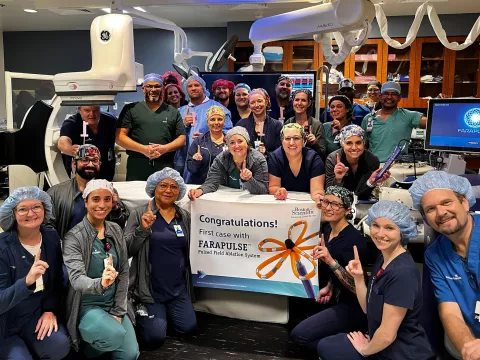- AdventHealth
Accurately determining food intake remains a challenge in nutrition research. A new study published in Nature Metabolism, co-authored by AdventHealth Translational Research Institute (TRI) investigator Karen D. Corbin, PhD, RD, introduces a metagenomics-powered approach to accurately track dietary intake from gut microbiome samples.
Developed by Christian Diener, PhD, in the Gibbons Lab at the Institute for Systems Biology (ISB), the new method, called MEDI (Metagenomic Estimation of Dietary Intake), detects food-derived DNA in stool samples to estimate dietary intake, allowing for data-driven diet tracking without the use of questionnaires. Data from AdventHealth TRI’s Integrating Quantitative Energetics Determines the Microbiome's Contribution to Energy Balance study (NCT02939703) published in Nature Communications in 2023 helped to validate this new method.
MEDI leverages stool metagenomics, a sequencing of all the DNA present in fecal samples, including microbial, human, and food-derived DNA. This non-invasive, data-driven approach offers an objective alternative to traditional food diaries and questionnaires, which are still the gold standard in dietary assessment but can suffer from misreporting and compliance issues.
Key findings of the latest study include the following:
- An Alternative to Questionnaire-Based Diet Tracking: Leveraging a database of more than 400 food items and over 300 billion base pairs of genomic information, MEDI accurately detected food intake patterns in infants and adults, and across two controlled feeding studies.
- Connecting Dietary Intake to Nutrition: MEDI converts the relative abundance profile of specific food items into nutrient profiles, assuming a 100-gram portion. These nutrient profiles show good agreement with data from controlled feeding studies, including AdventHealth’s microbiome study.
- Identified Diet-Related Health Risks: Without food logs, MEDI pinpointed dietary features linked to metabolic syndrome in a large clinical cohort.
“This is the perfect example of how collaboration advances science,” shares Dr. Corbin. “The data from our original TRI study was a small but important piece of this new research. We’re excited about the potential power this work holds to expand our overall understanding of interactions between diet and the gut microbiome and to further development of precision nutrition approaches that could help reduce obesity and other chronic diseases.”
Recent News
The AdventHealth Neuroscience Institute is the first in Florida and one of the first in the country to begin recruiting patients with primary progressive or non-active secondary progressive multiple...
Discover what’s being accomplished in Central Florida to bridge the health gap with Orange County Mayor Jerry Demings and AdventHealth’s Dr. Alric Simmonds.
Breakthrough device offers new hope for stroke survivors struggling with rehabilitation following ischemic stroke
Jennifer Seminerio, MD, recently became one of the first in Florida to use intestinal ultrasound (IUS) to help assess and manage treatment of patients with inflammatory bowel disease (IBD). A non...
Physician leaders from AdventHealth’s emergency department, infectious disease, inpatient, pediatrics and pharmacy teams all collaborated to develop a respiratory virus testing algorithm to assist...
Thoracic surgeon Colleen Gaughan, MD, and her team at AdventHealth Celebration, recently became one of the first in the country to incorporate targeted imaging agent Cytalux (pafolacianine) as part of...
On the newest Inspiring Wholeness podcast, Obie Diaz, local morning radio show host, shares how a routine physical eventually led to two open heart surgeries.
AdventHealth recently began piloting a new Genomics Risk Assessment for Cancer and Early Detection (GRACE) program that combines the use of digital mammography, artificial intelligence (AI) technology...
AdventHealth Clinical Research Unit (CRU) Executive Director and Medical Director of Genitourinary Oncology Guru Sonpavde, MD, co-authored an article on the AMBASSADOR Phase III clinical trial results...
A promising new treatment for AFib patients called Pulse Field Ablation is first offered in Central Florida at AdventHealth and shows less damage to tissue.
Plastic and Reconstructive Microsurgeon Sabrina Pavri, MD, and Breast Surgeon Devina McCray, MD, recently began offering immediate neurotization after breast reconstruction, a new surgical technique...
Under the leadership of gynecologist and gynecological surgeon Omar Zwain, MD, AdventHealth for Women opened its new, multidisciplinary Comprehensive Fibroid Program at AdventHealth Winter Park in...












